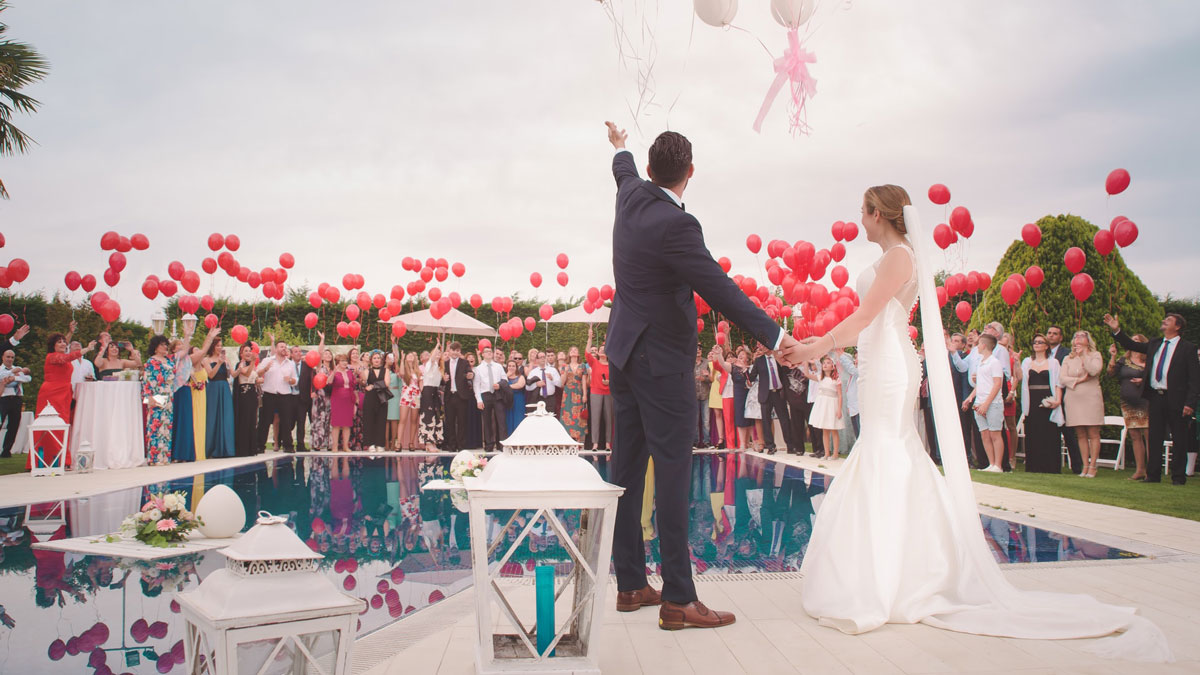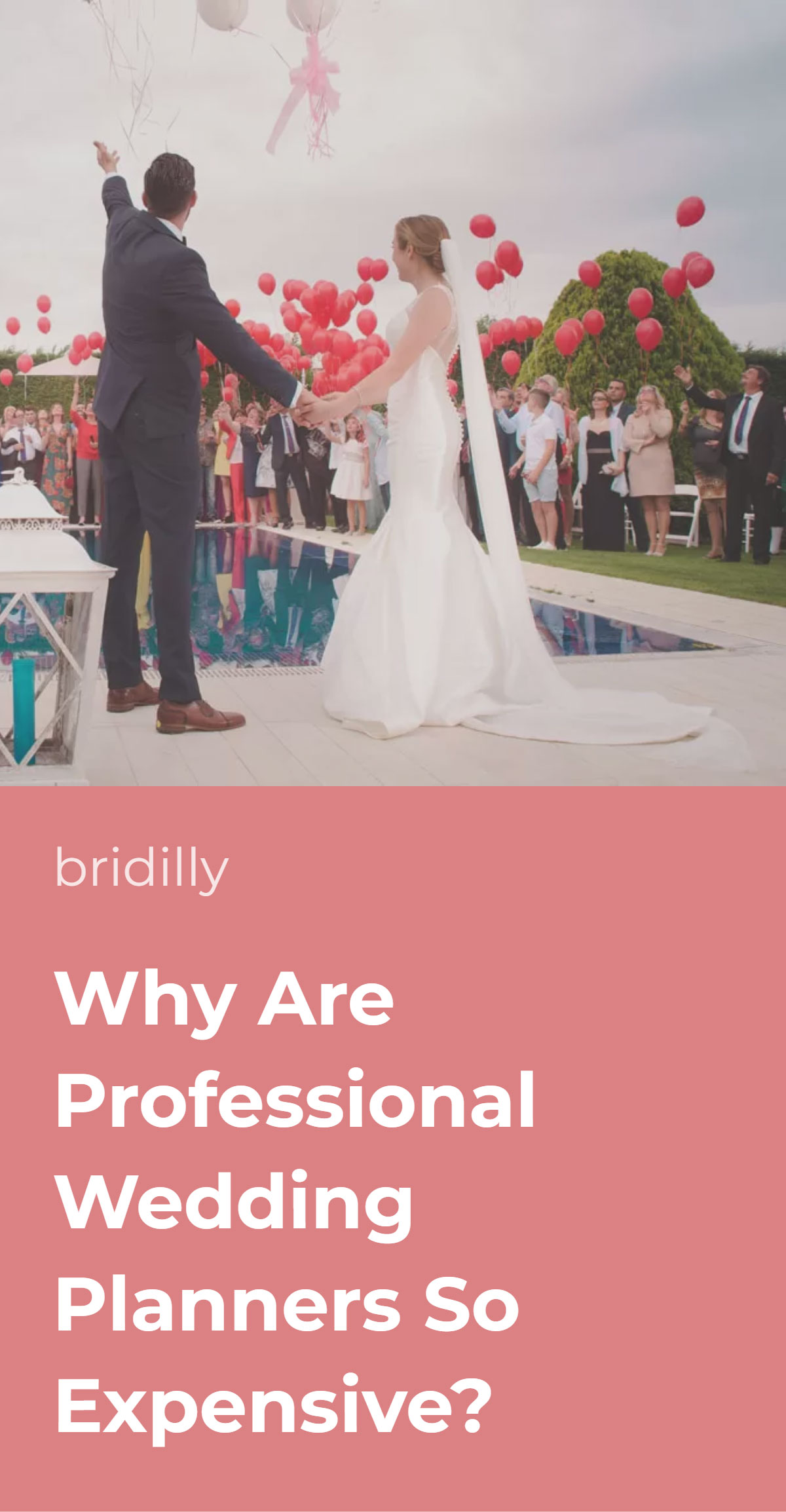The average flat fee of a wedding planner in the U.S. is about $1,800, while the most expensive wedding planner may charge over $5,000.
Such a high price may seem unnecessary, but it quickly becomes reasonable when you break down the costs.
The wedding planner’s duties include correspondence with the couple, selection and meetings with vendors, paperwork management, rehearsal coordination, post-wedding tasks, and that’s just the gist of it.
When breaking down wedding planner prices, people often neglect the business expenses and basic business rules.
Like each one of us, a wedding planner should cover the costs and get some overhead to live on.
Most importantly, a wedding planner saves the couple a lot of time, takes the stress off their shoulders, and ensures the event meets the couple’s expectations and runs flawlessly.
Such help can’t be evaluated in rough figures.
Table of Contents [show]
Discussions with the Couple
The wedding planner’s work starts with discussions with the couple. They strive to understand your wishes, determine the budget, the most and the least important factors in your dream wedding. This takes time and demands top-notch customer service.
Communication with the couple doesn’t end with initial discussions. You will communicate with the wedding planner throughout the entire process that typically lasts months, either by e-mail, phone, or in person.
One may think that a wedding planner should charge a lower fee for e-mail correspondence than for in-person meetings. But answering e-mails takes effort and time that could have otherwise been spent on other work.
The average time for wedding planning is 200-500 hours that extend for 10-18 months. About 30% of that time is spent on correspondence.
Wedding planners may charge a flat fee or an hourly rate; in either case, this adds up to a large sum.
Search & Communication with Vendors
Communication with vendors takes another 30% of a wedding planner’s time. The professional’s goal is to find the perfect venue, catering service, florists, band, and other vendors that fit your preferences and budget.
Searching for vendors involves more than typing in “wedding caterers in my area.”
Each service provider is interviewed to ensure they match your needs. Sometimes, the wedding planner may have to arrange meetings together with the couple.
Furthermore, the best vendors tend to be busy. Finding best of the best vendors available on one day is a challenging task.
Then, there are budget discussions. Often, vendors can suggest multiple ways of calculating the costs. The wedding planner should find one that’s the most beneficial for the couple.
Some experienced wedding planners already have connections in the industry and can help you pick vendors that will bring all your dreams to life.
These connections, which aren’t available for couples who plan their weddings on their own, may cost extra.
Venue Visits
A wedding planner can’t pick a venue based on pictures online. Even if they already have worked with the venue, they must show it to you to ensure you will be happy with it. And couples rarely agree on the very first venue they see.
Apart from initial viewings, the wedding planner will visit the venue multiple more times throughout the process to measure the room, come up with decoration ideas and placement, and ensure everything goes smoothly.
Document Management
This may be surprising to some, but wedding planning involves a lot of paperwork. Unfortunately, it isn’t as a creative process as you may imagine.
On the opposite, wedding planning can be rather cumbersome and demands deep knowledge of contract law.
Your wedding planner takes the burden of reading and managing contracts off your shoulders. Being a bride is already stressful enough, so this help is priceless.
Contract work consists not solely of reading and signing papers. The wedding planner must also arrange payments on time and ensure the vendors follow their responsibilities.
Apart from legal paperwork, the wedding planner is creating schedules and managing the timeline of wedding preparation.
Some elements of wedding planning are closely tied with others, so if something gets postponed, it may affect the entire event.
Wedding Preparation
The wedding day preparation doesn’t end with selecting vendors and signing contracts.
Your wedding planner should take care of all major and minor details you may not have even thought of, such as creating a wedding day timeline and seating chart or ordering invitations.
Wedding is a once-in-a-lifetime event, and you won’t have another shot to make it better. Thus, the wedding planner’s responsibility is to make it flawless, according to the highest standards and your wishes.
Such a level of attention to detail requires years of experience, knowledge, and effort. Trust me – wedding planners care about each event as if it was their own. But this attitude comes at an extra fee.
A professional knows more than any bride relying on articles online and can spot issues in your plan.
Even if you’ve picked all vendors, created the venue design, and ordered stationery yourself, consider hiring a planner to double-check you haven’t missed anything.
Rehearsal Coordination
A wedding rehearsal isn’t mandatory, you can totally skip it. But should you? A wedding rehearsal is necessary for the formal part of your event to run smoothly. Everyone involved should know where to stand, what to say, and when to enter the hall.
However, you can’t coordinate the rehearsal on your own. Since it’s likely your first wedding, you will be just as confused as everyone else. A wedding planner’s job is to give you clear directions and spot flaws in the process.
People without experience may not even think of aspects that are minor from first sight but are really very important.
For instance, a professional may advise on how to carry your bouquet or in which order the groomsmen should line up.
Last-Minute Challenges
Wedding planning doesn’t always go smoothly. This process can get extremely stressful for everyone involved. The couple often feels pressured to host the best event of the century, which may lead to a sudden change of plans.
For example, the bride may have agreed on artificial flower centerpieces, but her aunt then mentions artificial flowers are tacky.
And so, the bride rushes to tell the wedding planner that the centerpieces should be made from real blooms.
Another example is a sudden illness of a photographer or band member. The wedding planner’s job is to quickly find a worthy replacement, which may be extremely difficult since great professionals are booked for months in advance.
Such last-minute challenges often come at an extra fee, at this isn’t the wedding planner’s fault.
The vendors may charge cancellation or rush-order fees, and that’s justifiable. They may have to sacrifice their time to accommodate your last-moment amendments.
Post-Wedding Tasks
When the wedding is over, you will happily head home, perhaps, to pack your bags for a honeymoon trip. But not your wedding planner.
Not many know, but wedding planning also involves post-wedding tasks, such as returning rental items, closing balances, and coordinating the venue clean-up.
Weddings commonly end with the venue or rental item damages. The wedding planner should handle these issues, reviewing the contracts and paying fines accordingly.
Business Expenses
Like most professionals, wedding planners don’t just earn money for spending their time.
They should also cover business expenses, such as electricity and internet bills, business license, website, software programs, accounting services, and office rent.
The utility and rent prices tend to differ drastically between small towns and major metro areas, and that’s no wonder.
But many couples get surprised to see the contrast in the hourly rate of wedding planners from different areas.
Furthermore, a wedding planner’s work often involves traveling to meet with the couple, vendors, or visit stores in search of the bride’s requested decorations.
Travel expenses add up quickly, especially in large cities or in the case of destination weddings.
Limited Availability
Last but not least, wedding planners simply charge what they’re worth considering the limited time availability and demand.
The truth is that top-rated professionals are always in high demand. If one couple doesn’t agree on the price, another one will.
The more experienced and better rated a wedding planner is, the higher their rates; that’s a basic rule of business.
However, even top-rated wedding planners who seemingly charge immense rates aren’t all that pricey if you break down the earnings and expenses.
Let’s do quick math. The average cost of a wedding planner in a major city is about $3,000.
A single professional can plan 28 weddings a year at most, though even 15 weddings a year is considered a tightly packed schedule.
That sums up to $84,000 a year with 28 weddings or $45,000 with a more reasonable 15-wedding count. That’s close to the national average of about $51,000.
But that’s just the gross sales figures – don’t forget to add the expenses such as the cost of vendors and utility bills.
Then, subtract the taxes along with the employer’s share, and you’ll get an annual wage significantly lower than the nationwide average.
Considering how stressful is a wedding planner’s work, their rates are absolutely justified and even understated.
















No Comments Add one
Leave a Comment